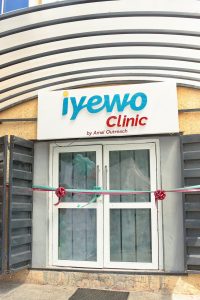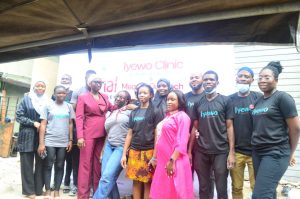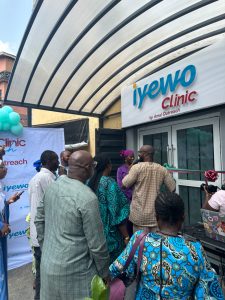• Nigeria’s mortality rate is high across many diseases
The opening of the Iyewo clinic in the Olowogbowo area of Lagos Island, Lagos, Southwest, Nigeria by Amal Outreach has brought a new ray of hope to many of the residents, especially the market men and women in the community.
The clinic, which offers a mixture of in-clinic, telemedicine and community (barefoot clinic) care at a low cost is an important facility that will ensure universal health coverage for the under-served community.
In this exclusive interview with Muslim News, a US based-Nigerian physician, Dr Jalilah Folake Kofo-Idowu, who is the founder and executive director of Amal Outreach laid bare her goals and objectives at the first phase of Amal Outreach’s free medical outreach last Saturday.
MN: Can we meet you?
Dr Jalilah: My name is Folake Kofo-Idowu. I am a double-board certified infectious disease and internal medicine physician by the American Board of Internal Medicine (ABIM). I practice clinical medicine in the U.S. and I am also a public health practitioner. I am the Founder and Executive Director of Amal Outreach.
MN: Tell us about Amal Outreach
Dr Jalilah: Amal Outreach is a non-profit organisation that is focused on sustainable healthcare delivery in underserved areas and also community development.

We work by trying to get people to get access to healthcare by doing medical outreaches like this. Also, we try to connect them to follow-up care which is something that is sorely lacking in our environment. When many people go to the hospital or outreaches, they are told that something is wrong, however, nobody follows up with them consistently to make sure that the problem is corrected or put under control. This is an issue that we have noticed and that’s why we set up a clinic which is subsidized and low-cost essentially.
This helps us to connect with people who either randomly walk into the clinic or people we diagnose at outreaches.
MN: What informed your decision to go into Amal Outreach?
Dr Jalilah: I think it’s borne out of the passion to serve, to give back to my community. But primarily, it was borne out of the experience my family had through my mother’s illness.
Sometimes back, when we were much younger, she had an infection; a very serious one that put her in a coma. She developed a kidney disease from there but she did not get good follow-up. She was going around with failing kidneys that caused hypertension, each worsening the other.
It was when I grew older and I got into medical school I realised through my learnings that my mum had pitting edema. Her legs were always swollen and when you press it, it goes down. So, it got me scared.
Eventually, we got the courage to take her to the hospital and we just discovered a myriad of things.

Her kidney was in stage 3, and it was just one kidney that was functioning, there were a lot of things.
She eventually had multiple surgeries, went into renal failure, was dependent on dialysis and all of those things were what led me into this (Amal outreach).
I was born in Lagos Island, grew up and lived all my life there till I went to the United States. My mum traded here also till she was ill. It just got me thinking that hundreds of thousands of traders are just like my mum. They come to the market six days a week. They come here very early and leave at night. Sunday is the only time they have and most clinics do not open in that day.
So I thought, how many of them have doctors or nurses in their families that can help them check their health? They (usually) just find a way to dismiss it until it gets very bad. And that was what spurred me that we have to do something.
Again, when you look at it, the economy of the country is very dependent on this class of people. In trading, there are hundreds of thousands of people that come through the Lagos Island market every day. Because people come from outside the country to trade here. People come from North Africa, West Africa, and East Africa to trade here.
So, when the people who run the economy are healthy, the country can generate more income and things become stable.

And for them also (the traders), these are people that their income is neither stable nor high, so you don’t want them to get into economic jeopardy from medical bills.
Remaining healthy is a good means of economic stability for families and communities. They can work, generate income, but with severe or long term illnesses, people spend hundreds of thousands to millions of naira, all of a sudden they will say “Oh, this illness has drained my finances”.
In such situations, some cannot bounce back and at that time, their children may drop out of school and that changes the trajectory of their lives.
Imagine the breadwinner developing a stroke in a family that’s subsisting. The major source of income gone, the little coming from elsewhere has to be rationed to still care of the sick.
So, those are the things that we are trying to prevent as much as possible. To keep people healthy, by diagnosing and treating early. Educating, counselling and just staying on top of things. So, we brought up this, non-profit Amal Outreach.
MN: What is the difference or relationship between Amal Outreach and Iyewo clinic?
Dr Jalilah: Amal Outreach is the parent organisation, it’s a non-profit organisation. And we have different Strategies.
Again, the first thing is accessible quality healthcare for underserved communities. In doing that, we are doing outreach on one end and the clinic is a second way that we are providing access to healthcare.
So, Iyewo Clinic is the primary care service that offers a mix of telemedicine, in-clinic and community care. People can come to our clinic. Our community health workers go into the market, meet with people, talk to them, get history and listen to their issues. When they have issues, they can call or text the doctor, consult with the doctor and get prescriptions.

And of course, that process of communicating with the doctor through voice or video calling or texting the doctor is how we are leveraging technology for telemedicine.
It’s a social enterprise that is focused on impact. Whatever money that is made is put directly back into the clinic to make sure it’s running. So, our prices are marked for sustainability.
MN: Is this the first time you are doing an outreach?
Dr Jalilah: We have had multiple medical outreaches. We have had 10 outreaches before this one. This will be our 11th. And for this year, we have a year-long plan. Every second Saturday of the month till November, we will have an outreach in different parts of Lagos Island.
We are also working with other partners and potential partners and collaborators to go outside of Lagos Island to other local governments in Lagos.
MN: What do you think Nigeria’s healthcare needs the most?
Dr. Jalilah: Like every other thing, or most other things in the country, healthcare needs a lot of help. There are a lot of issues across all the tiers of health including primary, secondary and tertiary.
Nigeria has one of the very poor indices healthcare measures; cancer death rates, infant mortality and maternal mortality rate. The death rate due to very preventable things is very high and that’s unnecessary.
Also, we have a high rate of preventable and easily treatable conditions and we just need to sit down as a people and figure out what works for us and try to implement it.
Well, we need to be bold, even though we have different cultures and ethnicities. At the end of the day, everybody wants to be healthy, live a good life, take care of their family and enjoy life.
MN: For this outreach, what medical-specific health conditions are your concerns?
Dr. Jalilah: For this outreach, the core things that we are screening for are hypertension, diabetes, HIV, and Hepatitis A & B. Also we are screening for _H. pylori_ which is the cause of gastric cancer when left untreated.
Also, three of our nine outreaches in a year will be at our clinic because we want to have dental examinations. There are a lot of people that have dental issues. Dental infections can be serious. Sometimes it seems like a little pain, but you have a little annoying pain every day that can affect the quality of your life.
Also, when people have serious dental issues, they can have infections that go close to the heart, brain and kill people in an instant.

We are planning to do the dental examinations with the assistance of dental students from the College of Medicine, University of Lagos and also Lagos State University College of Medicine.
MN: What is the number of patients targeted during your outreaches?
Dr Jalilah: At least 100. We are trying not to overload ourselves, we are trying to spread it out to at least 100 people every month.
MN: In what areas would you want government’s intervention?
Dr Jalilah: The government has its hands full already and I think what they can do is to ensure that government hospitals are working appropriately.
That will take the pressure off private hospitals and less need for medical outreaches like this. Unfortunately, the country and all over the world are going through a shortage of healthcare workers, especially in developing countries like ours.
For economic reasons, people are moving abroad. So, we are getting more and more critical shortages of medical workers.
MN: What is your take home for Nigerians?
Dr Jalilah: The take-home message for everyone is please stay on top of their health. Our role at Amal Outreach and Iyewo (clinic) is not just to heal but to keep people healthy. This is because there’s an economic cost to falling ill. When you’re ill, you are unable to earn and the money you have, you are spending on medications and things like that and drawing money from other sources.
So, the important thing is to try to stay healthy. And trying to stay healthy sometimes means asking questions when you think it’s not needed. Most people when you ask them, they say “I feel fine”. You might feel fine, but your blood pressure is high, you might feel fine but your blood sugar is high. And a lot of these things are silent killers.
So, my encouragement to everyone is “Stay on top of their health, get a primary care doctor, and get an annual age and risk-appropriate screening.” Those are the important things.
A 20-year-old might not need cervical cancer screening but a 35-year old definitely needs and that is age-appropriate. But a 20-year-old who is sexually active might get a cervical cancer screening, and that is risk-appropriate. So see your professional who would recommend age and risk-appropriate screenings for you.







